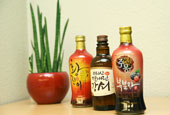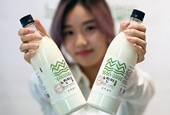Wild ginseng was first mentioned in the ancient Oriental book of medicine "Shang Han Lun," written by Zhang Zhongjing during the later Han period in around A.D. 200. Since then, the various effects of wild ginseng have been recorded in numerous other medical books.
The most notable effect of wild ginseng is to revitalize one's energy. People rely on ginseng more than any other ingredient to recover from various deficiencies, poor health or low levels of energy, and to regain their health after suffering from an illness. For example, blood circulation does not occur automatically. As blood circulation is powered by energy, we need to boost the impetus that cycles energy around our body to help blood circulation.
Wild ginseng is a medicine that reinforces one's natural healing power, which helps overcome disease on one's own. Wild ginseng is more like a medicine that reinforces one's body than one that cures a disease. Korean wild ginseng, in particular, is known for its great health benefits.
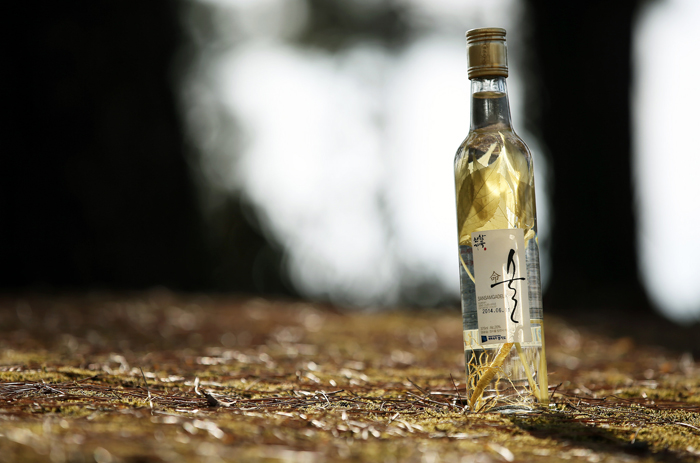
Recently, the Gyeonggi-do Agricultural Research & Extension Services and the Daenong Bio Farming Agricultural Association Corp. together developed the Sansamgadeuk brand of herbal liquor using wild Korean ginseng. In 2010, Daenong Bio Farming adopted some patented technologies and began to produce makgeolli and herbal liquors using wild ginseng, and related products. It also developed a technology that uses microwaves to produce saponin-enhanced liquors. Saponin helps restore energy and improve brain functions. It also helps fight various diseases, such as high blood pressure and diabetes, and has anti-cancer, anti-oxidant and cholesterol lowering effects.
Myeongsul, made from wild cultivated ginseng, is one of the first functional liquors to come to market that contains saponin. Wild cultivated ginseng, or sanyang sansam in Korean, is grown deep in the mountains. Ginseng growers plant seeds or baby ginseng deep in the mountains where wild ginseng can grow by itself.
Myeongsul has a wonderful mild scent of ginseng that can be felt when it flows down one's throat. The scent is strong, but not too heavy. People can also feel the scent of wet soil after the rain and the burning of dry fallen leaves. To feel the gracious scent of wild ginseng, the liquor can be consumed with dishes that do not use heavy seasonings. Sashimi served only with horseradish and pan-fried fish fillets, with a thin coating of flour, go well with this liquor.
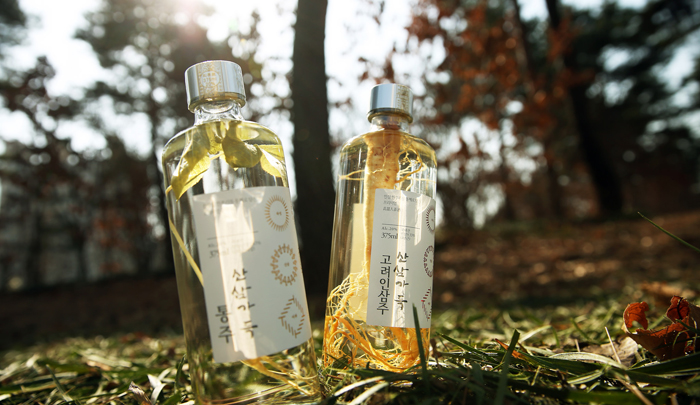
Korean Ginseng Liquor is another traditional alcohol, and it contains five-year-old wild cultivated ginseng. The liquor is made using traditional brewing methods passed down through the generations by ginseng diggers. It is known for its deep scent and rich flavors. The drink can taste bitter, but the bitterness gives off a feeling of refreshment when the alcohol flows through one's body. It is refreshing and it can be consumed after a short stint spent hiking. Because of its strong scent, it can be served with foods that have a lighter taste and which are cooked with a minimal amount of spice. Foods made with chicken, such as chicken soup with ginseng (samgyetang) and braised spicy chicken (jjimdak), or pork dishes, can go well with this liquor.
Another traditional liquor, Tongju, contains an entire piece of two-year-old wild cultivated ginseng, which helps enhance the saponin content. The scent of saponin is intense when it is consumed. It may sting a little in the beginning, but the aftertaste is mild, soft and sweet, creating a pleasant harmony. A low-fat white fish goes well with this liquor. A clear fish soup or broiled fish, or meat with low fat, such as pigs' feet and boiled beef or pork slices, can go well with this liquor.
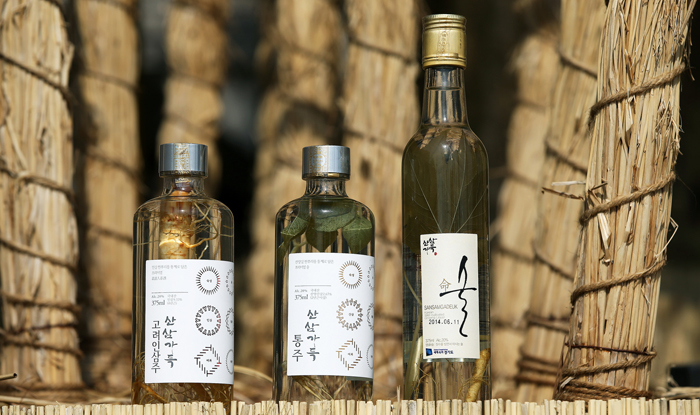
Daenong Bio Farming produces traditional liquors with wild cultivated ginseng grown in environmentally healthy areas of Gwangju in Gyeonggi-do. It is now establishing a wild ginseng cultivation area that covers 6.6 square kilometers. Korean Ginseng Liquor, Tongju and Myeongsul from Daenong Bio Farming all received a bronze medal in the liquor section at the Korea Liquors Contest in 2014.
By Limb Jae-un
Photos: Jeon Han
Korea.net Staff Writers
jun2@korea.kr
*For more information on the liquors, please call +82-1688-0642 or visit www.woorisansam.com.
The most notable effect of wild ginseng is to revitalize one's energy. People rely on ginseng more than any other ingredient to recover from various deficiencies, poor health or low levels of energy, and to regain their health after suffering from an illness. For example, blood circulation does not occur automatically. As blood circulation is powered by energy, we need to boost the impetus that cycles energy around our body to help blood circulation.
Wild ginseng is a medicine that reinforces one's natural healing power, which helps overcome disease on one's own. Wild ginseng is more like a medicine that reinforces one's body than one that cures a disease. Korean wild ginseng, in particular, is known for its great health benefits.

Myeongsul, a drink made from five-year-old wild cultivated ginseng, offers a wonderful scent of ginseng that can be felt as the drink flows down one's throat.
Recently, the Gyeonggi-do Agricultural Research & Extension Services and the Daenong Bio Farming Agricultural Association Corp. together developed the Sansamgadeuk brand of herbal liquor using wild Korean ginseng. In 2010, Daenong Bio Farming adopted some patented technologies and began to produce makgeolli and herbal liquors using wild ginseng, and related products. It also developed a technology that uses microwaves to produce saponin-enhanced liquors. Saponin helps restore energy and improve brain functions. It also helps fight various diseases, such as high blood pressure and diabetes, and has anti-cancer, anti-oxidant and cholesterol lowering effects.
Myeongsul, made from wild cultivated ginseng, is one of the first functional liquors to come to market that contains saponin. Wild cultivated ginseng, or sanyang sansam in Korean, is grown deep in the mountains. Ginseng growers plant seeds or baby ginseng deep in the mountains where wild ginseng can grow by itself.
Myeongsul has a wonderful mild scent of ginseng that can be felt when it flows down one's throat. The scent is strong, but not too heavy. People can also feel the scent of wet soil after the rain and the burning of dry fallen leaves. To feel the gracious scent of wild ginseng, the liquor can be consumed with dishes that do not use heavy seasonings. Sashimi served only with horseradish and pan-fried fish fillets, with a thin coating of flour, go well with this liquor.

Korean Ginseng Liquor (right) is made using a traditional brewing method, while Tongju is a type of soju.
Korean Ginseng Liquor is another traditional alcohol, and it contains five-year-old wild cultivated ginseng. The liquor is made using traditional brewing methods passed down through the generations by ginseng diggers. It is known for its deep scent and rich flavors. The drink can taste bitter, but the bitterness gives off a feeling of refreshment when the alcohol flows through one's body. It is refreshing and it can be consumed after a short stint spent hiking. Because of its strong scent, it can be served with foods that have a lighter taste and which are cooked with a minimal amount of spice. Foods made with chicken, such as chicken soup with ginseng (samgyetang) and braised spicy chicken (jjimdak), or pork dishes, can go well with this liquor.
Another traditional liquor, Tongju, contains an entire piece of two-year-old wild cultivated ginseng, which helps enhance the saponin content. The scent of saponin is intense when it is consumed. It may sting a little in the beginning, but the aftertaste is mild, soft and sweet, creating a pleasant harmony. A low-fat white fish goes well with this liquor. A clear fish soup or broiled fish, or meat with low fat, such as pigs' feet and boiled beef or pork slices, can go well with this liquor.

(From left) The Daenong Bio Farming Agricultural Association Corp.'s Korean Ginseng Liquor, Tongju and Myeongsul all received a bronze medal at the Korea Liquors Contest in 2014.
Daenong Bio Farming produces traditional liquors with wild cultivated ginseng grown in environmentally healthy areas of Gwangju in Gyeonggi-do. It is now establishing a wild ginseng cultivation area that covers 6.6 square kilometers. Korean Ginseng Liquor, Tongju and Myeongsul from Daenong Bio Farming all received a bronze medal in the liquor section at the Korea Liquors Contest in 2014.
By Limb Jae-un
Photos: Jeon Han
Korea.net Staff Writers
jun2@korea.kr
*For more information on the liquors, please call +82-1688-0642 or visit www.woorisansam.com.
